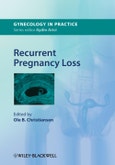Recurrent Pregnancy Loss
Edited by
Ole B Christiansen, MD, D.M.Sc., Rigshospitalet, Copenhagen and AalborgUniversityHospital, Aalborg, Denmark
Recurrent Pregnancy Loss is a silent problem for many women
The spontaneous loss of a pregnancy in the first 22 weeks is often not recorded as the mother needed no medical or surgical treatment. Women who repeatedly suffer this tragedy can go unheard as a result. Gynecologists can feel unable to help.
But they can help. Research is showing how to identify women who suffer recurrent pregnancy loss and which treatments might prevent a further recurrence. Gynecologists are learning how to monitor subsequent pregnancies for the early signals of problems.
Recurrent Pregnancy Loss provides a practical approach to this hidden clinical challenge. The highly experienced, international author team explores:
- How to obtain a relevant history
- Which investigations to order
- The physiological reasons behind recurrent pregnancy loss
- The best approach to treatment
- How to monitor patients in subsequent pregnancies
Clinical in approach, practical in execution, with the patient at the centre, Recurrent Pregnancy Loss guides you as you support your patients.
Table of Contents
Series Foreword vii
Contributors viii
Preface to the first edition xii
1 Obtaining the Relevant History 1
Ole B. Christiansen
2 Which Investigations Are Relevant? 10
Paulien G. de Jong, Emmy van den Boogaard, Claudia R. Kowalik, Rosa Vissenberg, Saskia Middeldorp and Mariëtte Goddijn
3 NK Cells in Peripheral Blood and the Endometrium 29
Gavin Sacks
4 Cytokines and Cytokine Gene Polymorphisms in Recurrent Pregnancy Loss 38
Silvia Daher, Maria Regina Torloni and Rosiane Mattar
5 How to Assess the Prognosis after Recurrent Miscarriage 46
Howard J.A. Carp
6 Which Treatments Should be Offered? PGD/PGS, Allogeneic Lymphocyte Immunization, Intravenous Immunoglobulin 61
Henriette Svarre Nielsen and Ole B. Christiansen
7 Which Treatment Should be Offered? Heparin/Aspirin, Progesterone, Prednisolone 70
Muhammad A. Akhtar and Siobhan Quenby
8 Which Treatment Should be Offered: Metformin, hCG, GM-CSF/G-CSF, TNF-α Inhibitors, Standard IVF/ICSI 78
Ole B. Christiansen
9 Talking to Patients about Lifestyle, Behavior, and Miscarriage Risk 86
Ruth Bender Atik and Barbara E. Hepworth-Jones
10 E ndocrine and Ultrasonic Surveillance of Pregnancies in Patients with Recurrent Miscarriage 103
Adjoa Appiah and Jemma Johns
11 Obstetric Complications in Patients with Recurrent Miscarriage – How Should they be Monitored
in the Third Trimester? 115
Shehnaaz Jivraj
12 Recurrent Miscarriage after ART: A Double Challenge 128
Elisabeth C. Larsen and Ole B. Christiansen
13 How to Cope with Stress and Depression in Women with Recurrent Miscarriage 135
Keren Shakhar and Dida Fleisig
14 Recurrent Miscarriage and the Risk of Autoimmune Disease and Thromboembolic Disease 146
M. Angeles Martínez-Zamora, Ricard Cervera and Juan Balasch
15 How to Organize and Run an Early Pregnancy Unit/Recurrent Miscarriage Clinic 157
AnnMaria Ellard and Roy G. Farquharson
16 How to Organize an Early Pregnancy Unit/Recurrent Miscarriage Clinic – American Perspective 172
Joanne Kwak-Kim, Kuniaki Ota and Ae-Ra Han
17 Case Studies 180
Ole B. Christiansen
Index 191








